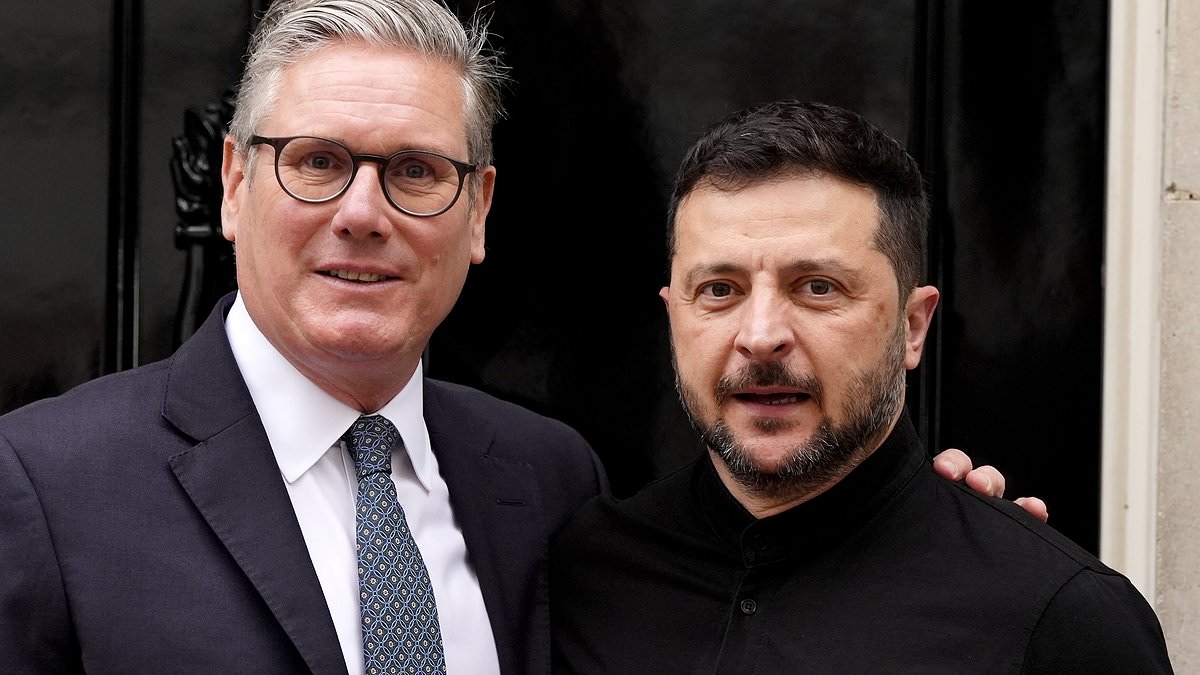
In a major development on the global stage, Sir Keir Starmer is set to join EU and NATO leaders at the White House on Monday to support Ukrainian President Volodymyr Zelensky during a pivotal meeting with former U.S. President Donald Trump. The gathering underscores a unified Western front in the face of escalating tensions with Russia.
EU and NATO Unite Behind Ukraine
European ministers and NATO allies fear that Zelensky may face undue pressure from Trump, who has previously clashed with the Ukrainian leader. These fears are compounded by concerns that Russian President Vladimir Putin is laying a diplomatic trap to manipulate the outcome of the meeting.
On Sunday, Zelensky convened a two-hour video conference with allies, including the UK and other nations in the “coalition of the willing,” to reaffirm their shared vision for peace in Ukraine. He emphasized that any agreement must avoid territorial concessions enforced by military aggression.
Bolstering Western resolve, French President Emmanuel Macron stated, “If we’re not strong today, we’ll pay dearly tomorrow.” Macron’s call to action came after former British Prime Minister Boris Johnson urged Starmer to lead efforts to prevent the dismemberment of Ukraine following a controversial Trump-Putin summit in Anchorage, Alaska, on Friday.
Tense Developments at the Alaska Summit
The Alaska meeting marked Putin’s return to the global stage, where he reportedly persuaded Trump to back Russian demands for Ukraine to cede the Donbas region. Leaked reports allege that Putin used fabricated evidence to claim that Ukrainian defenses in Donetsk and Luhansk were on the verge of collapse. The Kremlin’s proposition, which Washington allegedly moved closer to accepting, has sparked outrage among Western leaders.
However, Trump dismissed these concerns, labeling them “fake news,” while championing the summit as a “great meeting” with “big progress on Russia.” Trump’s special envoy, Steve Witkoff, revealed that the U.S. delegation secured NATO-like security guarantees for Ukraine, describing them as “game-changing.”
A Unified Front for Ukraine’s Sovereignty
Zelensky has called on European leaders to rally for moral and strategic support as he seeks to maintain Ukraine’s territorial integrity amid complex negotiations. Leaders including Macron, Italian Prime Minister Giorgia Meloni, German Chancellor Friedrich Merz, and European Commission President Ursula von der Leyen have pledged their backing ahead of Monday’s White House talks.
Starmer, in a statement, reaffirmed his commitment to standing with Ukraine “for as long as it takes.” He also praised Trump’s efforts to resolve the conflict while underscoring that “the path to peace cannot be decided without President Zelensky.”
Key Challenges Ahead
As momentum builds around the White House meeting, troubling reports suggest that Washington is considering concessions that could force Ukraine to relinquish control over the mineral-rich Donbas region. Despite these risks, Zelensky has insisted that territorial matters “should be discussed only by the leaders of Ukraine and Russia.”
Zelensky, accompanied by von der Leyen in Brussels on Sunday, emphasized, “Real negotiations must start where the front line is now.” He noted Putin’s repeated failures to capture Donetsk, a critical stronghold in the conflict.
Meanwhile, U.S. Secretary of State Marco Rubio has indicated a guarded optimism, suggesting that potential terms discussed in Alaska could garner Ukrainian support. Rubio added, however, that peace may remain elusive, given Russia’s resistance to a ceasefire.
The Path Forward
As the White House prepares for this high-stakes meeting, the stakes couldn’t be higher. Zelensky’s diplomatic efforts aim to secure NATO-backed guarantees while ensuring that Ukraine’s sovereignty is preserved. The coalition of Western allies, including the UK, reaffirmed their readiness to deploy a reassurance force should hostilities cease, signaling their commitment to long-term stability in the region.
The coming days will shape not only the future of Ukraine but also the broader balance of power across Europe and beyond.






